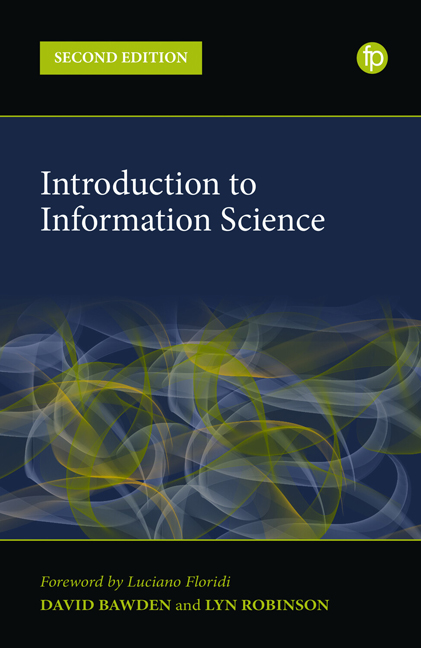Book contents
- Frontmatter
- Contents
- Figures
- Preface
- Foreword – Curators of Semantic Capital
- List of Acronyms
- 1 The Information Science Discipline
- 2 History of Information: the Story of Documents
- 3 Philosophies of Information
- 4 Paradigms, Turns and Theories in the Information Sciences
- 5 Information
- 6 Documents and Documentation
- 7 Domain Analysis
- 8 Information Organisation
- 9 Digital Technologies and Data Systems
- 10 Information Systems
- 11 Informetrics
- 12 Information Behaviour
- 13 Communicating Information: Changing Contexts
- 14 Information Management and Policy
- 15 Information Law and Ethics
- 16 Information Society
- 17 Digital (Onlife) Literacies
- 18 Research in the Information Sciences
- 19 The Future of the Information Sciences
- Additional Resources
- Index
6 - Documents and Documentation
Published online by Cambridge University Press: 21 April 2022
- Frontmatter
- Contents
- Figures
- Preface
- Foreword – Curators of Semantic Capital
- List of Acronyms
- 1 The Information Science Discipline
- 2 History of Information: the Story of Documents
- 3 Philosophies of Information
- 4 Paradigms, Turns and Theories in the Information Sciences
- 5 Information
- 6 Documents and Documentation
- 7 Domain Analysis
- 8 Information Organisation
- 9 Digital Technologies and Data Systems
- 10 Information Systems
- 11 Informetrics
- 12 Information Behaviour
- 13 Communicating Information: Changing Contexts
- 14 Information Management and Policy
- 15 Information Law and Ethics
- 16 Information Society
- 17 Digital (Onlife) Literacies
- 18 Research in the Information Sciences
- 19 The Future of the Information Sciences
- Additional Resources
- Index
Summary
Is a star a document? Is a pebble rolled by a torrent a document? Is a living animal a document? No. But the photographs and the catalogues of stars, the stones in a museum of mineralogy, and the animals that are catalogued and shown in a zoo, are documents.
Suzanne Briet (1951, 10)An object is to be considered a document when there is an assertion or a perception of evidence for some belief.
Michael Buckland (2017)Introduction
Documents, as carriers of information, play a central role in the information disciplines and professions, and the documentation movement of the first half of the 20th century was one of the predecessors of information science. However, although documents carry information and data, they are not synonymous with either. The complex relation between these concepts, and the significance of that relation for the information disciplines, has been discussed for many years, gaining new impetus in recent years. For diverse and detailed perspectives on the concept of document, and its relationship to information and data, see Hjørland (2000), Ørom (2007), Kosciejew and Richard (2015), Furner (2016) and Schöpfel et al. (2020).
We will look first at the document theory, introduced by the first documentation movement, and further developed by the neo-documentalists from around 1990, and then consider some current and future issues relating to document categorisation and organisation. Finally, we will examine the changing nature of collections of documents.
Document theory
The English word ‘document’ comes from the Latin docere, to teach or to inform, with ‘-ment’ implying the means. The Oxford English Dictionary defines a document as ‘something written, inscribed, etc., which furnishes evidence or information upon any subject’, and this is how documents are generally understood.
It might therefore be thought that the meaning of ‘document’ is straightforward and that the only issues that can arise relate to the differences between printed and electronic documents. This is far from the case. It can be argued that if a ‘document’ is some physical thing which records thoughts or ideas – information – then we should include paintings, sculpture, and perhaps even any artefact, as documents.
- Type
- Chapter
- Information
- Introduction to Information Science , pp. 99 - 112Publisher: FacetPrint publication year: 2022



